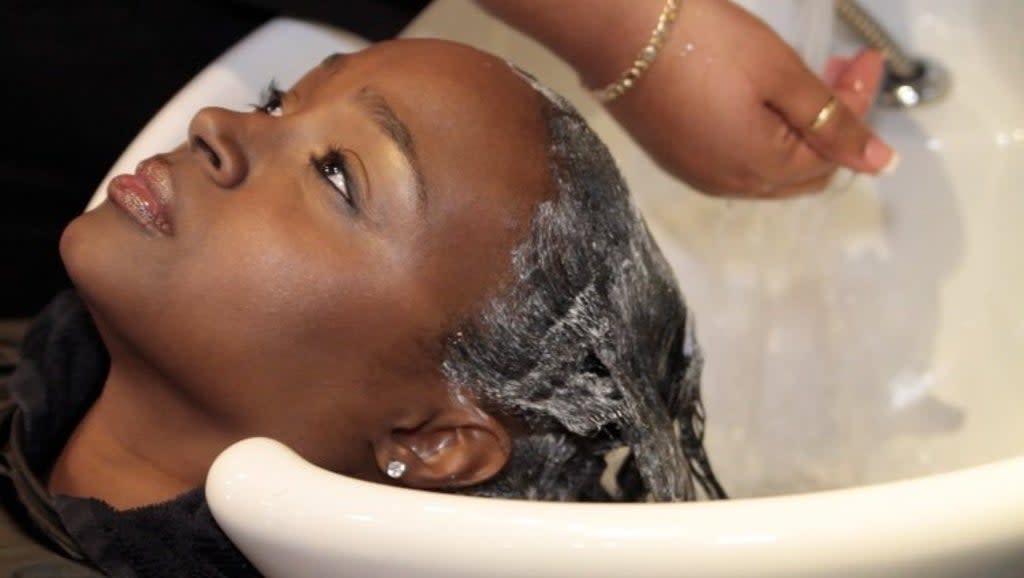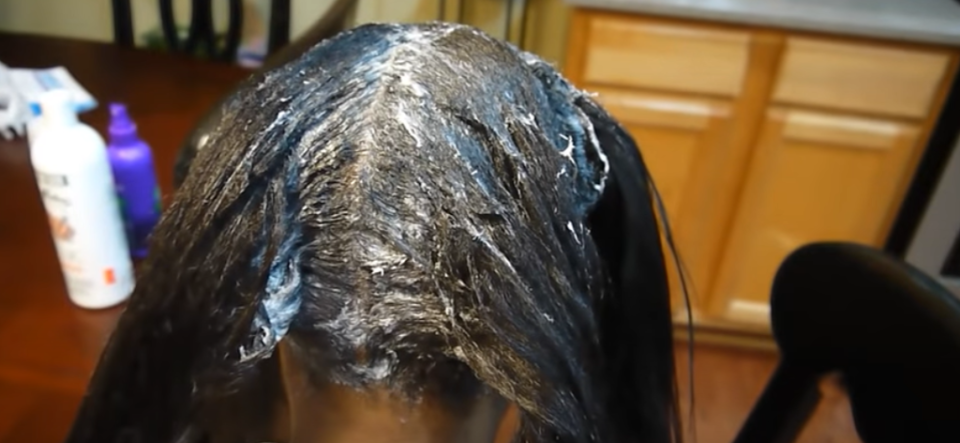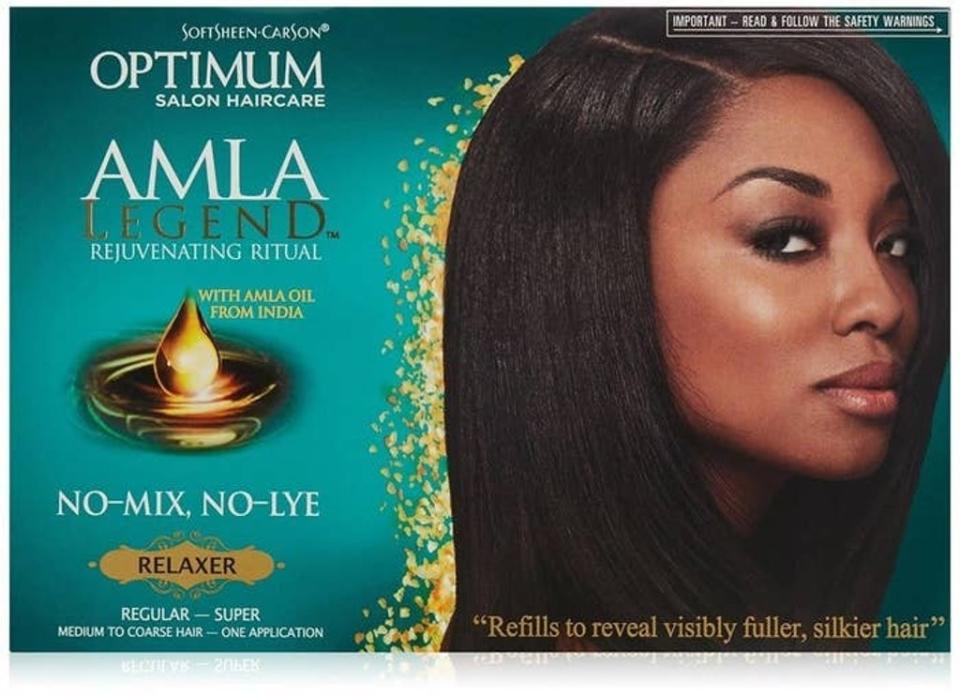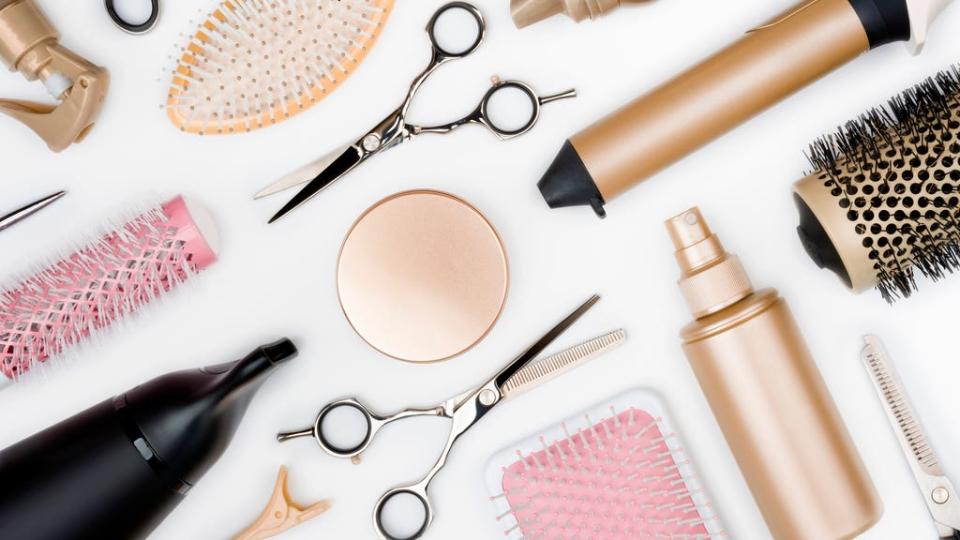Campaign urges beauty firms to pull ‘toxic’ hair products aimed at Black women

A campaign group is demanding that “toxic” hair products marketed at Black women are taken off the shelves, following research that found long-term use of lye-based relaxers may be linked to increased breast cancer risk, The Independent can reveal.
Level Up is targeting major brands, including L’Oréal, Revlon and Motions over shampoo and relaxants containing lye and other chemicals linked to serious health complications including hormone imbalance, asthma, fibroids and fertility problems.
The group, which previously forced ITV to remove plastic surgery and diet pill adverts from Love Island, is behind the #NoMoreLyes campaign petition and is challenging the brands to respond.
Lye is the common name for highly caustic sodium hydroxide.
Seyi Falodun-Liburd, the group’s co-director, said it is “disgraceful that well-established companies are still using harmful hydroxides in their relaxers”.
“As a girl, I remember spending hours in the salon with my mum, watching countless women who looked like her enter, sit in the chair, have the relaxant cream slathered on, and leave looking like different women,” she said.
“None of us knew that these products could make us seriously, fatally, unwell.
“If the lives of Black women and girls are important to these companies, they’ll listen to the science and the voices of Black women and take these poisonous products off the shelves.”

A recent study, published in the Carcinogensis Journal by Oxford University, concluded that Black women who used lye-based relaxers at least seven times a year for over 15 years or more had around a 30 per cent increased risk of developing breast cancer, compared with those who used it less frequently.
The US-based researchers examined data from Boston University’s Black Women’s Health Study, which assessed the medical diagnoses of 50,000 African American women over a 25 year time period plus variable factors that could impact upon their wellbeing.
Between 1997 and 2017, some 95 per cent reported using lye-based relaxers and 2,311 developed breast cancers.
Concerns around racial disparities in healthcare linked to chemicals found in cosmetic products are not new; previous studies, as far back as 2012, have also suggested a correlation between chemical relaxer use and uterine fibroids, a condition that disproportionately affects Black women.
Data published in the International Journal of Cancer (2019) revealed that permanent dye use could determine a heightened breast cancer risk in Black women by up to 45 per cent compared with approximately 7 per cent among white women.
Detailed research in this area has yet to be carried out in the UK, but Black British women are twice as likely to be diagnosed with advanced breast cancer than their white counterparts, according to data from Public Health England and Cancer Research UK.
Fibroids occur at a younger age and grow more quickly in Black women and are the reason behind over 50 per cent of hysterectomies among this group across the UK, compared with 30 per cent of white women.

Francesca, 34, has backed the #NoMoreLyes campaign and said Black women are all too often coerced into adhering to standards of beauty which is costing lives.
“My sister and my partner’s family have used hair relaxers throughout their lives,” she told The Independent.
“The pressure on women to conform to white western beauty ideals is astounding even now, to think this is compounded by physical poisoning is galling.
“I will be boycotting these companies until this changes.”
Potentially harmful substances are found in relaxer kits, hot oil treatments, leave-in conditioners and anti-frizz balms, research has shown.

The Independent recently examined products aimed at Black women in UK-based hair shops and found that many contain lye including: Classic Rhelaxer by Mizani, Shea Miracle Bouncy Curls Pudding by African Pride, OGX Beauty’s range of shampoos and conditioners, plus a variety of Dark & Lovely shampoos.
Some relaxer kits, such as Just for Me No-Lye Conditioning Crème for children, Africa’s Best Herbal Intensive Deep Conditioning No-Lye Relaxer System and Softsheen Carson’s Optimum Salon Haircare Defy Breakage No-Lye Relaxer, contain lye in its contents despite packaging stating otherwise.
A spokesperson from cosmetic giant Johnson & Johnson, which is behind the OGX line of products, said: “The health and safety of the people who use our products is our top priority. Our hair care products are intended for use in all hair types, and our marketing campaigns are culturally inclusive.
“Sodium hydroxide is used at low levels approved by the EU Cosmetics Product Regulation, to balance the pH levels of our products. We carefully select ingredients and stand behind the performance and rigorous testing of our products.”
Responding to #NoMoreLyes, World Afro Day founder Michelle De Leon said the matter needs greater attention from harmful products for adults to ones marketed towards children too.
“The fact that child relaxers even exist, which chemically breakdown the hair structure, I would now like to see some studies and action looking at the ingredients in children’s Afro hair products too,” she told The Independent.
“If we can ask companies to be cleaner for the environment, then we can also ask them to protect Black women’s bodies from harmful chemicals.
“Hair discrimination has long been a life and death issue for Black people and more studies are showing this to be the case.”

L’Oréal has previously been taken to task for its product ingredients; a string of US lawsuits in recent years have seen thousands of women claim that the brand’s lye and “no lye” components have caused hair loss and scalp burns.
In response to this one particular lawsuit in 2016, L’Oréal said “repeated warnings” on the packaging made clear the product’s “capacity to cause injuries” and said “no reasonable consumer would gather that the product is not ‘caustic’ when faced with exterior packaging containing warnings like ‘contains alkali,’ ‘wear gloves,’ ‘can cause blindness,’ ‘serious injury to ... skin,’ and ‘permanent hair loss,” according to a BuzzFeed report.
Lekia Lee, founder of long-standing Afro hair visibility campaign Project Embrace has also backed #NoMoreLyes.
“The idea that the chemicals in relaxers can be dangerous to our physical health has been out there for 10 years or more now; the fact that the government is not doing much to hold brands and corporations accountable for what they are putting into the market is a reflection of the lack of concern over Black lives,” she told The Independent.
“The multimillion hair straightening industry is successful on the back of hair discrimination and the anxiety around Afro textured hair. Even though the government should be doing it already, we have to make them do more to protect Black women’s health.
“I can’t help but wonder though, if there was a beauty product for white women and girls, that could potentially cause diseases like cancer, how much lobbying would the government need.”
She added: “This lack of regard for Black women’s issues is as a result of looking at humanity through a singular lens of whiteness. When the idea of beauty, health, humanity is filtered through this lens, we create a society lacking in diversity and ignoring the benefits of inclusion.”

A spokesperson from The L’Oréal Group told The Independent: “The L’Oréal Group is committed to upholding the highest standards of safety for all the products it makes and sells.
“All the ingredients used in L’Oréal’s products are safe for use as directed and have been subject to a rigorous scientific evaluation of their safety, by our internal experts as well as independent experts.”
The Cosmetic, Toiletry & Perfumery Association (CTPA) represents all types of company involved in the UK cosmetics industry.
Dr Emma Meredith, director general of CTPA, said: “All cosmetic products in the UK are safe to use, and safety is the top priority of the cosmetics industry for each and every consumer. The ingredients in hair relaxers do not cause breast cancer; in fact, the study authors themselves state that ‘the results of this study were largely null’, and the results from this study cannot be used to conclude that certain hair relaxers impact breast cancer development.”
For context, the study’s summary states: “Results of this study were largely null, but there was some evidence that heavy use of lye-containing hair relaxers may be associated with increased risk of ER+ breast cancer.”
A spokesperson from the Department for Business, Energy and Industrial Strategy said: “Keeping people safe is the government’s top priority, which is why the UK has some of the strictest product safety laws in the world.
“By law, cosmetics may only be placed on the UK market if they are safe. There are restrictions on the use of potentially harmful chemicals in cosmetic products, including specific controls relating to chemicals permitted in hair dyes.”
The Independent has approached Revlon and Godrej Consumer Products.
Read More
‘All hell will break loose’ if Geronimo is killed and then tests negative for TB, says expert
London riots, ten years on: ‘There was looting but it was a protest and we need to remember that’
Man with right to British citizenship facing deportation to Jamaica
Too many young people going to university, says education charity chief
Geronimo the alpaca must die, insists environment secretary
Stanley Johnson urges PM son to stop ‘murder’ of Geronimo the alpaca


